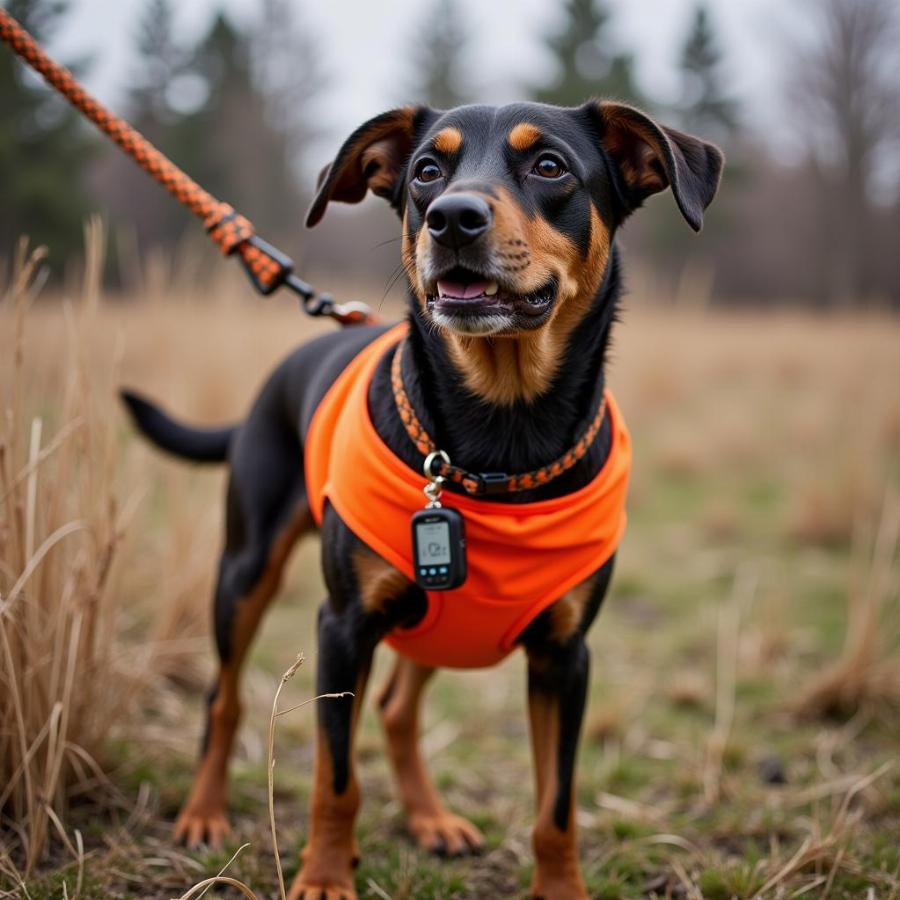Small hunting dogs may not have the imposing stature of their larger counterparts, but what they lack in size, they make up for in tenacity, agility, and a surprisingly powerful hunting instinct. These compact canines are perfectly suited for hunting small game, navigating dense underbrush, and even flushing out larger prey. If you’re considering adding a small hunting dog to your pack, understanding their unique characteristics and needs is crucial for a successful and rewarding partnership.
Choosing the Right Small Hunting Dog Breed
Selecting the right small hunting dog breed depends on your specific hunting needs and lifestyle. Some popular choices include feisty terriers like the Jagdterrier, bred for tenacity and underground hunting prowess; scent hounds like the Beagle, renowned for their exceptional tracking abilities; and versatile spaniels like the Brittany Spaniel, known for their bird-hunting skills and gentle nature.
Each breed possesses unique characteristics and excels in specific hunting scenarios. Researching different breeds thoroughly will help you find the perfect fit for your hunting style and personality. Do you prefer a dog that flushes game, retrieves, or tracks? Considering these factors will narrow down your choices and lead you to the ideal small hunting companion.
Training Your Small Hunting Dog: A Foundation for Success
Training your small hunting dog is essential for developing their natural instincts and ensuring a safe and successful hunting experience. Start with basic obedience training from a young age, establishing clear commands and boundaries.
Introduce them to the specific scents and sounds associated with their target game gradually. Positive reinforcement techniques, such as praise and treats, work best with these intelligent and eager-to-please dogs. Consistency and patience are key to building a strong bond and maximizing their hunting potential.
Caring for Your Small Hunting Dog: Health and Nutrition
Maintaining your small hunting dog’s health is paramount for their performance and overall well-being. A balanced diet rich in protein and essential nutrients is crucial, especially during the demanding hunting season. small breed hunting dogs
Regular veterinary checkups, vaccinations, and parasite prevention are vital to prevent health issues. Pay close attention to their paws, as they are prone to injuries while navigating rough terrain. Providing adequate rest and recovery time after hunts is also essential for their long-term health.
What are the common health concerns for small hunting dogs?
Small hunting dogs can be prone to certain health conditions like hip dysplasia, patellar luxation, and certain eye problems. Regular veterinary checkups are crucial for early detection and management.
Essential Gear for Small Hunting Dogs
Equipping your small hunting dog with the right gear enhances their safety and performance in the field. A well-fitting collar with identification tags is essential. Consider a GPS tracker for added safety, especially when hunting in dense areas.  Essential Gear for Small Hunting Dogs
Essential Gear for Small Hunting Dogs
A bright orange vest increases their visibility, preventing accidental injuries. Durable boots protect their paws from rough terrain and extreme weather conditions.
What type of collar is best for a small hunting dog?
A comfortable, well-fitting collar made of durable material is essential. Consider a tracking collar with GPS capabilities for added safety during hunts.
Is a Small Hunting Dog Right for You?
Small hunting dogs offer a unique blend of companionship and hunting prowess. They are adaptable, intelligent, and full of energy, making them ideal partners for active individuals and families. However, their high energy levels and hunting instincts require dedicated training and consistent exercise. squirrel dogs for sale
If you’re prepared to invest the time and effort in training and providing a stimulating environment, a small hunting dog can be a rewarding and loyal companion, both in the field and at home.
Conclusion
Small hunting dogs pack a powerful punch in a compact package. Their tenacity, agility, and keen hunting instincts make them valuable partners in the field. By understanding their unique needs and investing in proper training and care, you can forge a strong bond with your small hunting companion and enjoy countless successful hunts together. Choosing the right breed, providing essential training, and maintaining their health are crucial for a rewarding partnership with these mighty mini hunters. black brittany dog
FAQ
- Are small hunting dogs good with children? This depends on the breed and individual temperament. Early socialization and proper training are crucial for a harmonious household.
- How much exercise do small hunting dogs need? They require significant daily exercise, both physical and mental, to prevent boredom and destructive behaviors.
- Can small hunting dogs live in apartments? While possible, it’s essential to provide ample exercise and mental stimulation to meet their high energy needs.
- What is the lifespan of a small hunting dog? Their lifespan varies depending on the breed, but it generally ranges from 10 to 15 years.
- Are small hunting dogs easy to train? They are generally intelligent and eager to please, making them relatively easy to train with positive reinforcement methods.
- What are the best small hunting dog breeds for beginners? Beagles and Brittany Spaniels are often recommended for beginners due to their relatively easy-going temperaments and trainability.
- Do small hunting dogs bark a lot? Some breeds, particularly scent hounds, are known for their vocal nature.
Other Questions You Might Ask
- What are the best training techniques for small hunting dogs?
- How to introduce a small hunting dog to other pets?
- What are the best hunting accessories for small dogs?